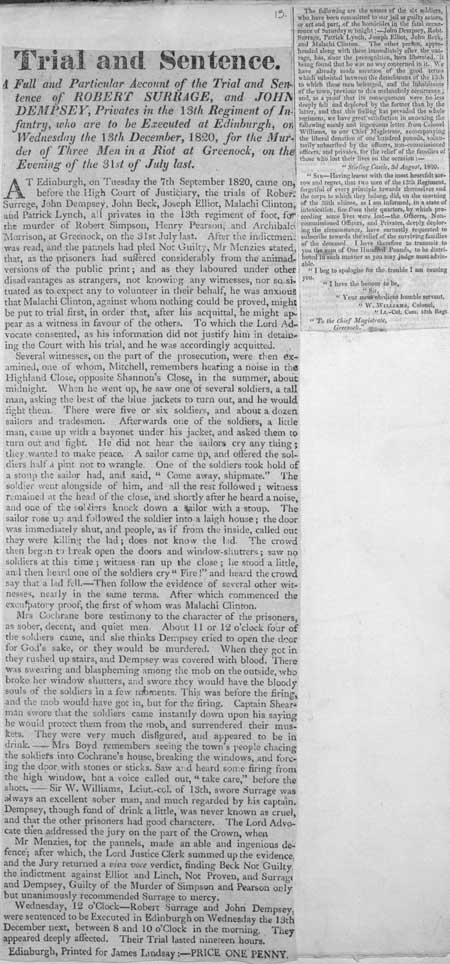Transcription
Trial and Sentence. A Full and Particular Account of the Trial and Sen
tence of ROBERT SURRAGE, and JOHN DEMPSEY, Privates in the 13th Regiment of In-
fantry, who are to be Executed at Edinburgh, on
Wednesday the 13th December, 1820, for the Mur-
der of Three Men in a Riot at Greenock, on the
Evening of the 31 st of July last. AT Edinburgh, on Tuesday the 7th September 1820, came on,
before the High Court of Justiciary, the trials of Robert
Surrege, John Dempsey, John Beck, Joseph Elliot, Malachi Clinton,
and Patrick Lynch, all privates in the 13th regiment of foot, for
the murder of Robert Simpson, Henry Pearson, and Archibald
Morrison, at Greenock, on the 31st July last. After the indictmen
was read, and the pannels had pled Not Guilty, Mr Menzies stated,
that, as the prisoners had suffered considerably from the animad-
versions of the public print; and as they laboured under other
disadvantages as strangers, not knowing any witnesses, nor so si-
tuated as to expect any to volunteer in their behalf, he was anxious
that Malachi Clinton, against whom nothing could be proved, might
be put to trial first, in order that, after his acquittal, he might ap-
pear as a witness in favour of the others. To which the Lord Ad-
vocate consented, as his information did not justify him in detain-
ing the Court with his trial, and he was accordingly acquitted. Several witnesses, on the part of the prosecution, were then ex-
amined, one of whom, Mitchell, remembers hearing a noise in the
Highland Close, opposite Shannon's Close, in the summer, about
midnight. When he went up, he saw one of several soldiers, a tall
man, asking the best of the blue jackets to turn out, and he would
fight them. There were five or six soldiers, and about a dozen
sailors and tradesmen. Afterwards one of the soldiers, a little
man, came up with a bayonet under his jacket, and asked them to
turn out and fight. He did not hear the sailors cry any thing;
they .wanted to make peace. A sailor came up, and offered the sol-
diers half a pint not to wrangle. One of the soldiers took hold of
a stoup the sailor had, and said, " Come away, shipmate." The
soldier went alongside of him, and all the rest followed ; witness
remained at the head of the close, and shortly after he heard a noise,
and one of the soldiers knock down a sailor with a stoup. The
sailor rose up and followed the soldier into a laigh house; the door
was immediately shut, and people, as if from the inside, called out
they were killing the lad; does not know the Lad. The crowd
then began to break open the doors and window-shutters; saw no
soldiers at this time ; witness ran up the close ; he stood a little,
and then heard one of the soldiers cry " Fire!" and heard the crowd
say that a lad fell.?Then follow the evidence of several other wit-
nesses, nearly in the same terms. After which commenced the
exculpatory proof, the first of whom was Malachi Clinton. Mrs Cochrane bore testimony to the character of the prisoners,
as sober, decent, and quiet men. About 11 or 12 o'clock four of
the soldiers came, and she thinks Dempsey cried to open the door
for God's sake, or they would be murdered. When they get in
they rushed up stairs, and Dempsey was covered with blood. There
was swearing and blaspheming among the mob on the outside, who
broke her window shutters, and swore they would have the bloody
souls of the soldiers in a few moments. This was before the firing,
and the mob would have got in, but for the firing. Captain Shear
man swore that the soldiers came instantly down upon his saying
he would protect them from the mob, and surrendered their mus-
kets. They were very much disfigured, and appeared to be in drink------Mrs Boyd remembers seeing the town's people chacing the soldiers into Cochrane's house, breaking the windows, and forc-
ing the door with stones or sticks. Saw and heard some firing from
the high window, but a voice called out, " take care," before the shots.------Sir W. Williams, Leiut.-col. of 13th, swore Surrage was always an excellent sober man, and much regarded by his captain.
Dempsey, though fond of drink a little, was never known as cruel,
and that the other prisoners had good characters. The Lord Advo-
cate then addressed the jury on the part of the Crown, when Mr Menzies, for the pannels, made an able and ingenious de-
fence'; after which, the Lord Justice Clerk summed up the evidence,
and the Jury returned a viva voce verdict, finding Beck Not Guilty
the indictment against Elliot and Linch, Not Proven, and Surrage
and Dempsey, Guilty of the Murder of Simpson and Pearson only
but unanimously recommended Surrage to mercy. Wednesday, 12 o'clock?Robert Surrage and John Dempsey,
were sentenced to be Executed in Edinburgh on Wednesday the 13th
December next, between 8 and 10 o'clock in the morning. They
Appeared deeply affected. Their Trial lasted nineteen hours.
Edinburgh, Printed for James Lindsay:?PRICE ONE PENNY.
View Commentary | Download PDF Facsimile
|
 |
Date of publication:
1820 shelfmark: Ry.III.a.2(13)
 View larger image
View larger image
|


